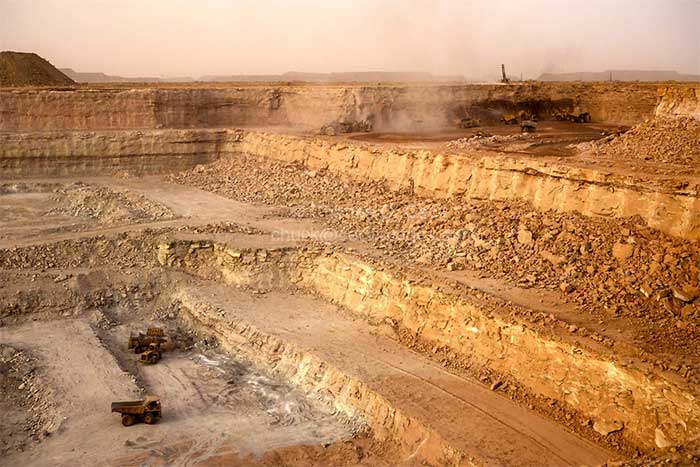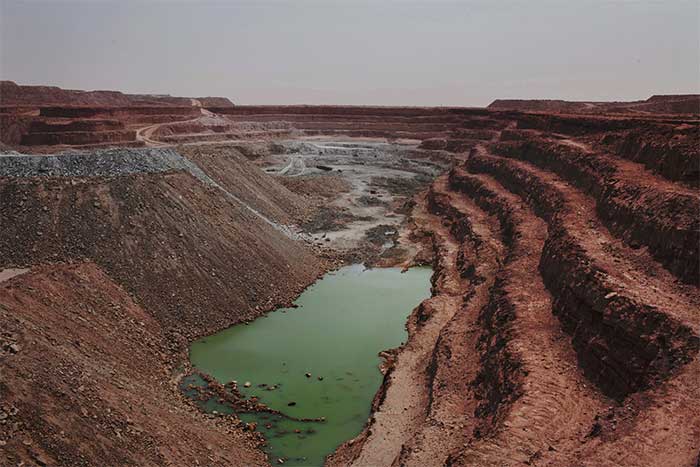Reuters cites information from the World Nuclear Association (WNA) stating that Niger is the seventh-largest producer of uranium in the world.
Uranium is Niger’s primary export and has made this landlocked country in West Africa a global focal point, according to the Washington Post.
This radioactive metal is the most widely used fuel for nuclear energy. It is also utilized in cancer treatment, naval propulsion systems, and nuclear weapons.
Not only is Niger the seventh-largest uranium producer globally, it also possesses the highest-grade uranium ore in Africa and is one of the main uranium exporters to Europe. France is the primary importer of Nigerien uranium, which fuels the vast civilian nuclear industry in France.
Niger produced 2,020 tons of uranium in 2022, accounting for about 5% of global production. This figure is a decrease from 2,991 tons in 2020. The three largest uranium producers in the world are Kazakhstan, Canada, and Namibia, according to the World Nuclear Association (WNA).

An open-pit uranium mine in Arlit – a desolate settlement on the southern edge of the Sahara Desert. (Photo: Charles O. Cecil/Cecilimages).
Uranium was first discovered in the town of Azelik in Niger in 1957 by the French Bureau de Recherches Géologiques et Minières (BRGM) while searching for copper. The French Atomic Energy Commission (CEA) initiated further studies. Niger’s first commercial uranium mine began operations in 1971.
The town of Arlit is a desolate settlement on the southern edge of the Sahara Desert. It was here, in the dry lands of northern Niger, that French geologists discovered this precious radioactive mineral. Since then, French state-owned companies have exploited this resource, turning Niger into the seventh-largest uranium producer in the world. In 2022, the mines around Arlit accounted for 25% of the total uranium imported by the European Union (EU), WNA reports.
France’s Leading Uranium Supplier
In a nuclearized country like France, the demand for uranium is significant. Following the events in Niger, concerns quickly arose about potential uranium shortages in France’s nuclear power plants. This highlights Niger’s crucial role in the global market for fissile metal and its importance in supplying France.
In an article titled “How Dependent is France on Niger’s Uranium?” from the newspaper Le Monde, it states: In France, fears are particularly focused on the extraction of uranium from Niger and the potential consequences of this energy dependence. As a vital natural resource for the operation of France’s nuclear power plants, uranium from Niger has been mined for over four decades by the French nuclear fuel cycle company Orano (formerly Areva).
Le Monde analyzes that to operate 56 nuclear reactors in 18 power plants, France needs an average of about 8,000 tons of natural uranium each year. After halting extraction in France in the early 2000s, France has turned to several countries for supply.

An open-pit uranium mine Tamgak at the Somair uranium extraction facility of Orano in Arlit, Niger. Photo taken on September 25, 2013. (Photo: REUTERS/Joe Penney/File Photo).
In the past decade, 88,200 tons of natural uranium imported into France mainly came from three countries: Kazakhstan (27%), Niger (20%), and Uzbekistan (19%). Niger plays a significant role in France’s uranium supply.
The multinational company Orano, 90% owned by the French government, operates three mines in Niger (currently only one of which is active), including:
1. Aïr Mine
The Aïr Mine is operated by the Somair company – in which Orano holds a 63.4% stake – located near the town of Arlit, in the northern Niger desert. Although the mine is nearing depletion, it is estimated that operations will continue until 2040.
2. Akokan Mine
The Akokan mining area, about 10 km from Arlit, has been closed since late March 2021. With depleted reserves after four decades of extraction, the Compagnie minière d’Akouta, in which Orano owns 59%, is currently undertaking a project to redevelop its mining area.
3. Imouraren Mine
Finally, Orano holds a 63.52% stake in the Imouraren Mine, located 80 km south of Arlit. Imouraren is considered one of the largest uranium mines in the world. However, production activities in this area have been suspended since 2014 until uranium prices improve.


















































